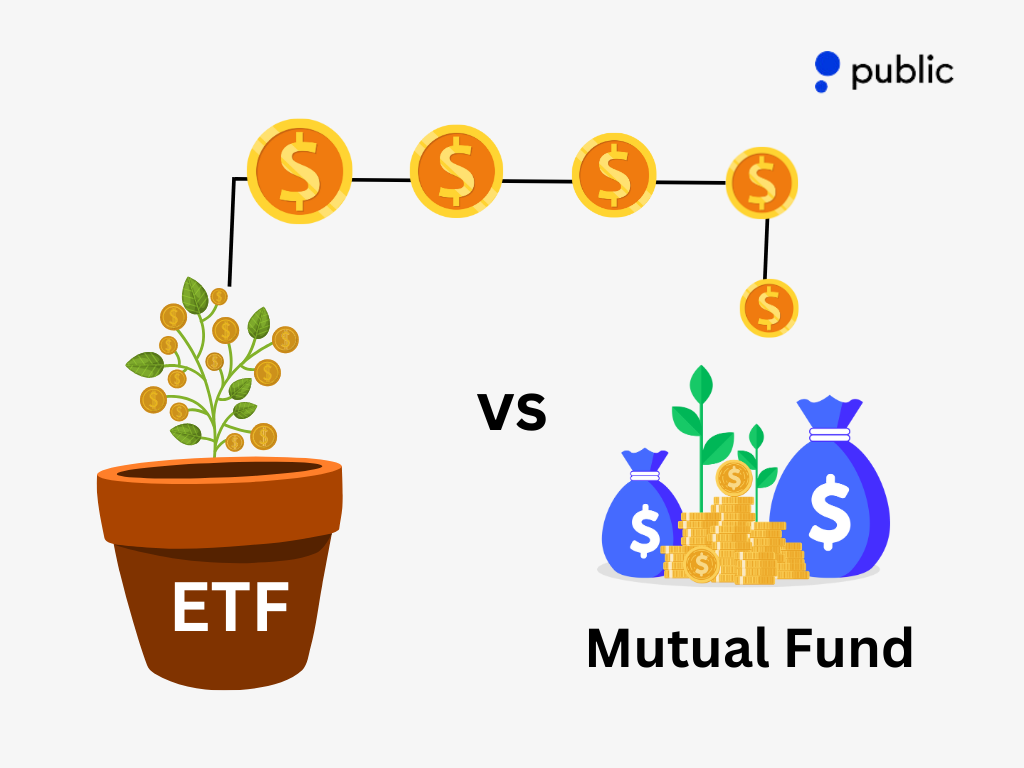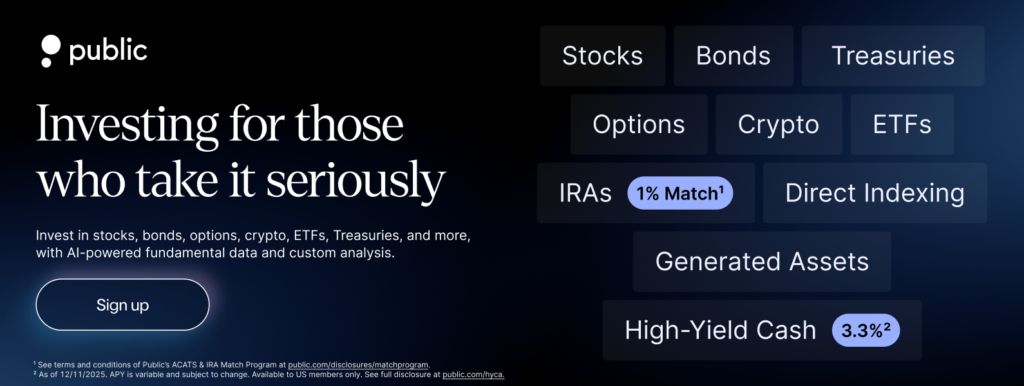Deciding where to invest your money can feel like a big decision, especially when comparing mutual funds and exchange-traded funds (ETFs). Both are widely used by U.S. investors and offer unique benefits. Let’s break it down so you can make the right decision for your financial goals.
ETFs and mutual funds: Understanding the differences

Table of contents
Key takeaways
-
One significant difference between mutual funds and ETFs is that ETFs can be bought and sold just like stocks during regular stock market hours. In contrast, mutual funds can only be purchased at the end of the trading day.
-
ETFs and mutual funds can be actively or passively managed. ETFs are usually passively managed, while mutual funds are typically actively managed.
-
Fees largely depend on fund management styles. Generally, passively managed funds have a lower expense ratio than actively managed funds.
-
Net asset value is the value of a company’s assets minus its liabilities. It’s often used when referring to ETFs and mutual funds.

What are mutual funds?
A mutual fund pools money from multiple investors to invest in a diversified portfolio of assets, such as stocks, bonds, or other securities, and is managed by professional portfolio managers who aim to outperform the market through strategic investment selection.
Many mutual funds are actively managed, meaning managers make deliberate buy-and-sell decisions to achieve the fund’s objectives, which can offer potential for higher returns but often come with higher fees.
Typically requiring a minimum investment ranging from $500 to $3,000 or more, mutual funds may be less accessible to beginner investors. Unlike stocks or ETFs, mutual funds are priced once per trading day at their net asset value (NAV), calculated after the market closes, so they cannot be traded at intraday prices.
What are ETFs?
Exchange-traded funds (ETFs) are investment funds that pool money from investors to create a diversified portfolio of assets, such as stocks, bonds, or other securities, and while they share similarities with mutual funds in terms of diversification, ETFs differ significantly in management and trading.
Many ETFs are passively managed, making them a cost-effective option for investors. They also offer trading flexibility, as they are traded on stock exchanges like individual stocks, allowing investors to buy and sell shares throughout the trading day. With a lower entry point, often requiring the purchase of just a single share, ETFs are more accessible for new investors.
Key differences between mutual funds and ETFs

Mutual funds and ETFs are both designed to provide diversification, but they have distinct characteristics. While mutual funds are typically actively managed and priced at the end of the trading day, ETFs are passively managed and traded like stocks throughout the day. The following table highlights the key differences between them to help investors make informed decisions.
| Feature | Mutual funds | ETFs |
|---|---|---|
| Management style | Actively managed by professionals who try to outperform the market. | Often passively managed, aiming to match the performance of a market index. |
| Cost | Typically have higher expense ratios due to active management. Average expense ratio: 0.60%-1%. | Lower expense ratios since they’re usually passively managed. Average expense ratio: ~0.15%. |
| Trading | Priced once a day at NAV; trades execute after market close. | Trade throughout the day, just like stocks, providing flexibility. |
| Tax efficiency | Less tax-efficient due to frequent buying and selling, leading to capital gains distributions. | More tax-efficient because of the “in-kind” creation and redemption process. |
| Minimum investment | Often have high minimum investment requirements (e.g., $500-$3,000). | Can be bought for the price of a single share, which could be as low as $10. |
| Liquidity | Transactions processed once per day; less liquid compared to ETFs. | Highly liquid; can be bought or sold any time during trading hours. |
| Transparency | Holdings typically disclosed quarterly, leading to less frequent updates. | Holdings disclosed daily, providing greater transparency for investors. |
| Distribution of returns | Dividends and capital gains distributed periodically, often annually, which may result in unexpected tax liabilities. | Dividends paid periodically; capital gains distributions are infrequent due to structural efficiencies. |
| Customization | Limited ability for investors to tailor holdings; must choose from existing fund offerings. | Investors can select from a wide range of ETFs to build a customized portfolio aligned with specific investment goals. |
Types of mutual funds
- Equity funds: These funds primarily invest in stocks and are often grouped by the size of the companies they invest in, such as large-cap, mid-cap, or small-cap stocks.
- Bond funds: These focus on fixed-income securities like government or corporate bonds, providing steady income with less risk compared to equity funds.
- Money market funds: These invest in short-term, low-risk debt instruments, such as Treasury bills, and are designed for stability and liquidity.
- Balanced funds: A combination of stocks and bonds, these funds aim to provide both growth and income, making them a middle-ground option for investors.
- Index funds: These passively track a specific market index, like the S&P 500, offering broad market exposure with lower management fees.
Now that you understand the types of mutual funds based on their investment focus, it’s also important to explore their structures, which determine how they operate and how investors can buy or sell them.
Potential benefits of mutual funds
- Professional management: If you prefer a hands-off approach, mutual funds offer access to professional expertise.
- Diversification: You get instant diversification, even with a single investment.
- Targeted goals: Many mutual funds are designed for specific objectives, like retirement or income generation.
Types of ETFs
- Equity ETFs: Offer exposure to stocks, tracking major indices like the S&P 500 or focusing on specific sectors, making them ideal for growth-oriented investors.
- Bond ETFs: Provide steady income through government or corporate bonds, suitable for investors seeking lower-risk options.
- Dividend ETFs: Focus on companies with high or consistent dividends, appealing to income-focused investors.

Potential benefits of ETFs
- Lower costs: The low expense ratios make ETFs an affordable choice.
- Real-Time trading: You can trade ETFs anytime during market hours, giving you more control.
- Tax efficiency: ETFs generally trigger fewer taxable events.
Tips for mutual funds and ETFs
- Understand your goals: Identify if you’re investing for short-term gains, retirement, or income. Mutual funds may suit long-term goals like retirement, while sector-focused ETFs align with short-term strategies.
- Compare fees: Look beyond expense ratios; include trading and account fees. Mutual funds (0.60%-1%) can offer active management, while ETFs (~0.15%) provide cost-efficient index tracking.
- Assess risk tolerance: ETFs can fluctuate intraday, posing risks for beginners, while mutual funds, with NAV pricing, offer stability but still carry market risks.
- Research thoroughly: Review performance, sector exposure, and management style. Actively managed funds can target higher returns, while ETFs like SPY track indices cost-effectively.
- Diversify wisely: Combine bond mutual funds for income with equity ETFs for growth. Diversification across assets and geographies can lowers risks and enhances returns.
ETF or mutual fund: Which one is right for you?
When deciding whether an ETF or mutual fund is the best option for you, it’s important to consider your investment style. Since they have similarities, determining your choice can come down to the types of stocks and bonds in the fund, whether you want an actively or passively managed fund, the fees and commissions you’re willing to pay, and the returns you’re looking for.
Especially for the beginner investor, it’s always important to do your research so you understand the costs involved in both options and check for any unforeseen fees. Both ETFs and mutual funds offer ways to diversify your portfolio.
Bottom line
Both ETFs and mutual funds offer a variety of benefits for investing as well as diversification. For investors who enjoy simplicity, ETFs offer a low-cost, easy way to get started with options in various markets that can provide a well-balanced and diversified portfolio geared to long-term investing.
On the other hand, mutual funds offer the opportunity to invest in smaller markets and specific niches that may be suited for investors looking for even greater diversification.
Are you ready to get started building your portfolio? It’s easy with the Public app!
